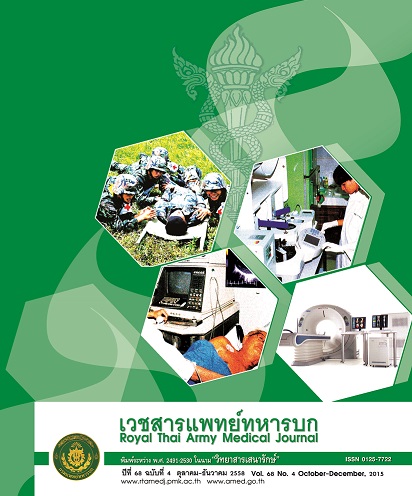การตรวจหาเอนไซม์บีตา-แลคทาเมสชนิดฤทธิ์ขยาย และแอมพ์ซี บีตา-แลคทาเมสในเชื้อกลุ่มเอนเทอโรแบคเทอริซีอี
Main Article Content
Abstract
กลไกสำคัญที่เชื้อกลุ่มเอนเทอโรแบคเทอริซีอีดื้อต่อสารต้านจุลชีพ ได้แก่ การสร้างเอนไซม์บีตา-แลคทาเมส ชนิดฤทธิ์ขยายและแอมพ์ซี บีตา-แลคทาเมส การศึกษานี้มี วัตถุประสงค์: เพื่อตรวจหาเชื้อกลุ่มเอนเทอโรแบคเทอริซีอีที่สร้างเอนไซม์บีตา-แลคทาเมสชนิดฤทธิ์ขยายและแอมพ์ซี บีตา-แลคทาเมส ในเชื้อที่แยกได้จากผู้ป่วยที่เข้ารับการรักษา ณ โรงพยาบาลวชิรพยาบาล กรุงเทพมหานคร วิธีการศึกษา: เชื้อที่ศึกษาแยกได้จากสิ่งส่งตรวจ จำนวน 400 ไอโซเลท นำมาตรวจหาการสร้างเอนไซม์บีตา-แลคทาเมสชนิดฤทธิ์ขยาย โดยวิธี double disc synergy test และตรวจหาเอนไซม์แอมพ์ซี บีตา-แลคทาเมส โดยวิธี AmpC disc test ผลการศึกษา:พบเชื้อที่สร้างเอนไซม์บีตา-แลคทาเมส ชนิดฤทธิ์ขยาย จำนวน 170 ไอโซเลท คิดเป็นร้อยละ 42.5 เชื้อที่สร้างเอนไซม์แอมพ์ซี บีตา-แลค ทาเมส จำนวน 21 ไอโซเลท คิดเป็นร้อยละ 5.3 พบเชื้อที่สร้างทั้งเอนไซม์บีตา-แลคทาเมสชนิดฤทธิ์ขยายและ แอมพ์ซี บีตา-แลคทาเมส จำนวน 7 ไอโซเลท คิดเป็นร้อยละ 1.8
Detection of Extended-Spectrum beta-Lactamase and AmpC beta-Lactamase in Enterobacteriaceae
The crucial antibiotic resistant mechanism of Enterobacteriaceae is the production of Extended-spectrum beta-lactamase (ESBL) and AmpC beta-lactamase. The aimed of this study was to investigate ESBL and AmpC beta-lactamase production in Enterobacteriaceae isolated from patients in Vajira Hospital, Bangkok. Method: A total of 400 clinical isolates of Enterobacteriaceae were examined for ESBL production by double disc synergy test and AmpC-producing strains were detected by AmpC disc test. Results: ESBL and AmpC - producing Enterobacteriaceae were 170 isolates (42.5%) and 21 isolates (5.3%), respectively. This study also found 7 isolates (1.8%) produced both ESBL and AmpC beta-lactamase.

